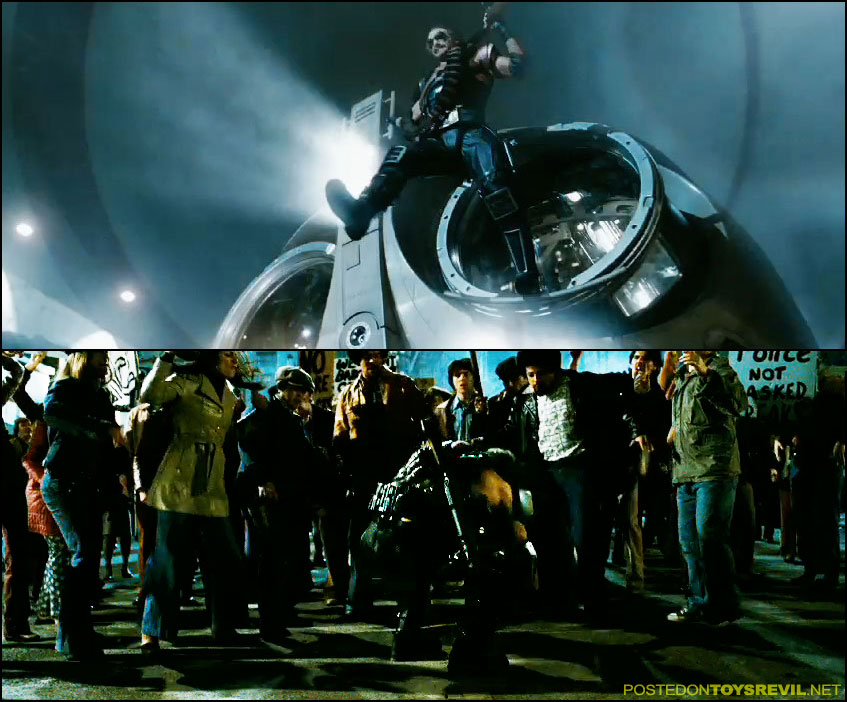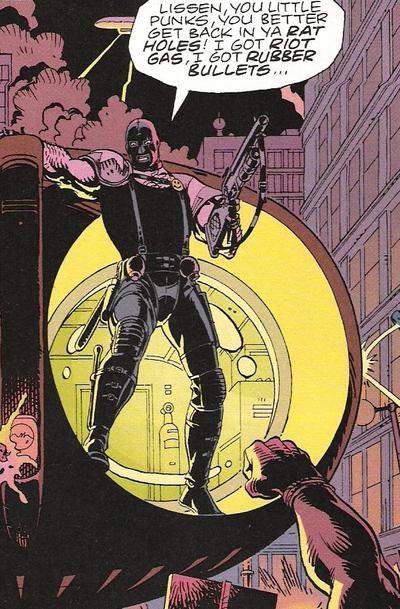A young man
tortures another young man. One super-hero flies through the air and massacres
some bad guys, whilst another murders a protester.
Game of
Thrones has officially become a cultural juggernaut. Season 3 managed to semi-consistently
pull over 5 million viewers (pretty spectacular for a modern series), and the
twists and turns have become prime watercooler conversation. One of the elements
that has certainly helped to boost viewership is violence. Looking at reviews or
summations of the series, the word which comes up the most is probably “brutal.”
In particular, the series isn’t shy about treating relatively central
characters with vicious disregard. That, in and of itself, has probably allowed
it to shed much of its geeky image.
“Bro… bro!
You need to check this show out. People get fucked up. Yeah, I know it’s
fantasy, but it’s like totally dark.”
Also, tits.
One can only hope
As anyone
who knows me will tell you, I like violence (and who doesn’t?). However, I’m
actually going to come down on the side of moderation. Regarding storytelling,
violence is a delicate thing that needs to be used at the correct time and in
the correct context. Something which can be an indicator of character or
purpose in one setting, is merely boring or unpleasant in another.
This will
discuss spoilers regarding the latest season of Game of Thrones, which if you
didn’t watch, you almost certainly had ruined for you. So consider that this
spoiler warning is for the rare, unicorn-like individual who is even
tangentially interested in it, and doesn’t know that Simon from Misfits is actually secretly Old Man Withers, the
amusement park owner.
I will also
be spoiling Watchmen, and Kick-Ass.
************SPOLIER
WARNING**********
When Violence is Dum / Gross
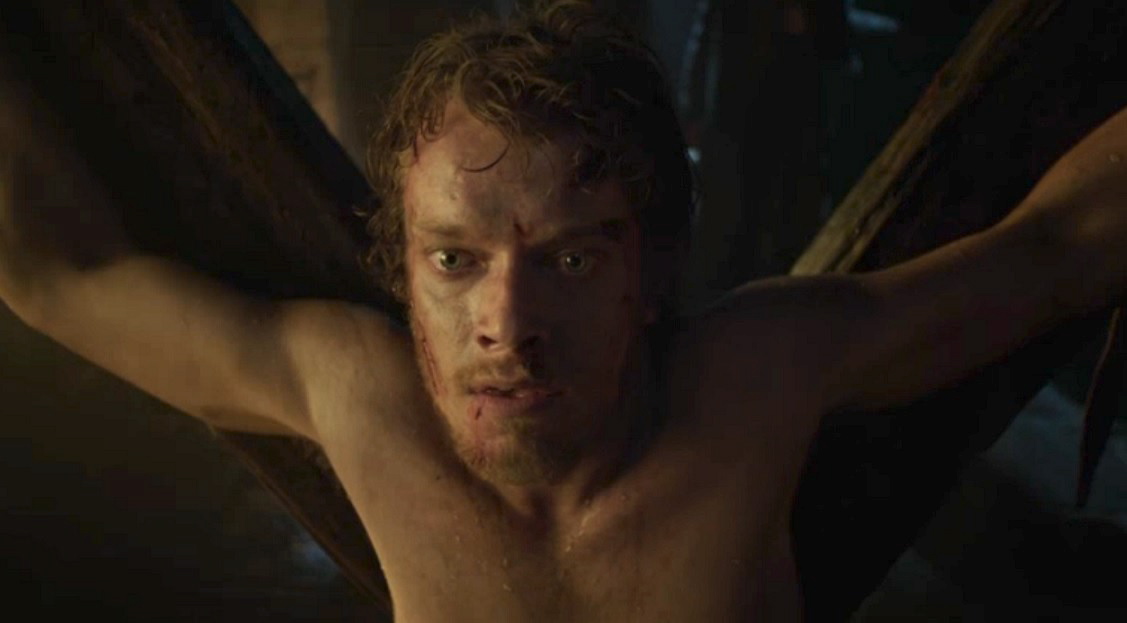
The Theon
Story. Holy smokes, this was terrible. TERRIBLE.
I generally
try to avoid “X source material is sooo much better than the remake” nerd
snobbery, but why the writers of the show chose to jettison most of the
elements of the “original” Theon / Ramsay story in the first place is somewhat
confusing. Whatever the reason, they stuck themselves in this situation, in
which Theon is captured and cannot escape for at least a season. There were, at
least, reasons for keeping him as a presence in the show, namely to keep from
him being forgotten in a swathe of new characters and storylines, and to keep
his (excellent) actor tied to the project.
However,
the season 3 scenes were almost universally derided by almost everyone I spoke
to, and with good reason. Each segment with Theon and his tormentor played out in
a woefully predictable way, with the torturer being mean to him, and then Theon
getting brutalized and whimpering.
This was
the television equivalent of pulling wings off flies. One of the key elements
to making fiction shocking is to actually shock,
to surprise the viewer. True horror gives the viewer hope, and then takes it
away. The scenes were thick with a dreary sense of inevitability- Theon has no
power, no chance of escape, and we simply watch as he gets tortured.
This is
essentially the difference between the first Saw film, which is pretty good,
and the subsequent 15(? Conservative estimate), which are just horrible things
happening to people in between batches of convoluted gibberish in a spooooky
voice.
It is
possible to make entirely downbeat, unpleasant fiction about awful situations and have it still be engaging to some extent. A good example of this
is Hiroaki Samura’s Bradherley no Basha, which is about…. Urgh. But it does
tell stories, and manages to evoke emotions, and genuinely raise the spectre of
hope (I still wouldn’t exactly recommend
it to anyone). The emotions most often evoked by the Theon scenes were a vague
sense of being grossed out, and boredom.

Bradherley no Basha. Blargh! Yuck.
The second section
where I felt like the series crossed the line was during the infamous Red
Wedding. I don’t have as much to say about this, but Tulisa getting stabbed
multiple times in the stomach was just unpleasant. The reason why the Red
Wedding was such an iconic cultural moment wasn’t (just) because of the
violence, or the brutality. It was because it happened to characters which the
viewers had gotten to know over the course of three seasons of television. The surprise
came from their deaths, not because their deaths were particularly vicious.
Having a pregnant woman being gutted didn’t add any more shock to the scene,
because that’s barely possible. It just added a slight tinge of tacky
exploitation to what was otherwise a masterfully handled, nail-biting scene of
absolute horror.
George R R
Martin, the writer of the original series of books, has fielded his own share
of criticism about some of the violence and mutilations. A common counter to
these criticisms is one of “historical accuracy” – he’s trying to make the
series realistic and gritty, and terrible, arbitrary things happened to people
in the past. The obvious refutation to make is that the books are fiction, and therefore can be judged under
the constraints of structure. If I wanted to read about terrible, arbitrary
things I could just read a history book.
Regarding
structure, for all the talk of the revolutionary, genre-busting nature of GoT /
aSoIaF, it is fundamentally a fairly traditional story of Ice Scots versus
Dragons, with a hero’s journey or two thrown in there. It has merely been (overly) fleshed
out with politicking, and redheaded chicks, and so on. Thus, when Martin decides to, say, make an
already-ugly character even uglier with the addition of some hideous facial
scarring, it’s OK to point at that decision and say “Hey, what was the point of
that, George?”
When Violence Fails in Illustraten Character
Jumping to
a wildly different tangent, let’s look at Mark Millar’s Kick Ass. The sequel to
the successful super hero film is coming out soon, and the original was
generally well-received. Millar is an interesting figure, who has been involved
in writing comics for a long time. I actually used to read some of his stuff in
2000AD as a nipper, including Cannon Fodder (a gun wielding priest teams up
with Mycroft Holmes to stop Sherlock Holmes from killing God. It’s difficult to
express how much more uninteresting this actually was, compared to how it
sounds), Maniac 5 (…Robocop), and Babe Race 2000.
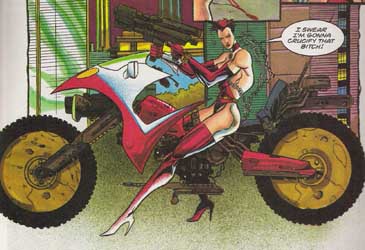
Babe Race 2000. Exactly what it sounds like.
In recent
years, he’s become a far better writer, and a powerful figure in the comics and
even film industries. Much of the success of updating the Avengers franchise
can be laid at his feet (his Ultimates series was essentially the blueprint for
the first film, he “cast” Samuel L Jackson as Nick Fury etc). He has a knack
for making cinematic stories, and a whole bunch of his properties have been
made into films, including Wanted, and, of course, Kick Ass. He does a good-sometimes-great
job of blending action with twists, and can actually make interesting, popular
work, which is much harder than it sounds, and something that a great many
filmmakers and writers fail at.
He’s a little like a comic book analogue of Quentin Tarantino, whom I wrote about in my
Django review. However, he does not have Tarantino’s auteur aspirations- his
work is geared towards popularity with a singleness of purpose that is almost
refreshing. Bombast and excess are Millar hallmarks. Everything is AWESOME! Or
CRAZY! Or, yes, SHOCKING! A bludgeoning salesmanship is constantly present, and
is backed up by a disconcertingly broad streak of misanthropy and
self-loathing, where he demands that the reader buy his book whilst
simultaneously excoriating them for being a loser nerd. Quickly dated
pop-culture references are rife, and if he’s written anything recently, I would
bet money that it references Game of Thrones, and probably Yeezus.
Kick Ass is
a story of a young man who decides to become a super hero. It is a very violent
film, but is toned down from its original comic. The sequel will almost
certainly deviate further from origins, because it’s going to have to. Even given that, Jim Carrey has apparently distanced himself from the project now that it has wrapped due to the levels of violence. Millar is
not shy about using things like rape as plot devices, and has basically no
depths to which he won’t sink. Take this scene from one of his other products,
for example, where the bad guy kidnaps the hero's daughter, and artificially inseminates her with her gay brother's semen. Sound unbelievably ridiculous? But wait! There's more!
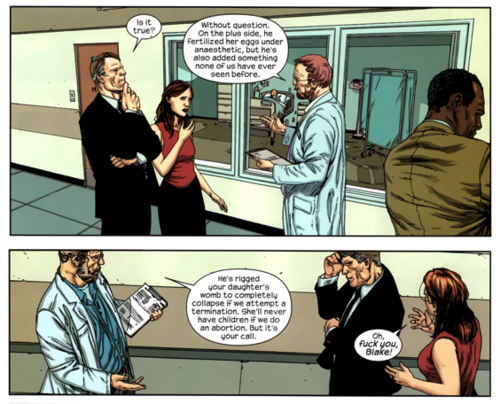
gggghhhhhhh
I’m torn
between contempt, laughing at how stupid it is, and a weird kind of grudging
respect at the balls or self-delusion required to actually put something that ridiculous down on
the page. Womb rigging. For Christ's sake. This is also being made into a film, by the way.
This is not
to say that Millar is stupid, far from it. The final scene from Kick Ass
involves the titular hero and sidekick/heroine/young girl psychopath Hit Girl
(she swears a lot! And kills tons of people! Extreme! Buy it loser buy buy buy) storming a mobsters hideout.
There’s a significant difference between the film and the comic. In the comic,
Kick Ass relies on his trademark tonfa sticks throughout the entire fight,
whereas in the film he dons a weird flying suit with miniguns attached, and shoots
a variety of villains to stirring music, before killing the main bad guy with a
rocket launcher.
In the
larger context of what has been a ridiculously violent movie, this shouldn’t
seem so bad. However, it fundamentally goes against the entire premise of the
story, which is this: what if an ordinary
guy tried to be a hero like Spider-man?
Kick Ass is
an innocent, and part of the charm of the story is seeing how he firmly keeps
to the non-killing ideals of a hero, despite being humiliated, beaten, and surrounded
by murderous lunatics. That he becomes a murderer like them in the film’s
climax is just… sad. James Gunn’s Super, a (better) film with a similar set-up
and premise, also has a violent slaughter as its final act. It functions a lot
better, however, as the entire story makes no bones about its main character
being an extremely disturbed individual who treads the line between heroism and
insanity.
Alan Moore
is arguably a marginally better writer than Mark Millar. Like Millar, many of
his works have made their way to the silver screen. Unlike Millar, none of them
have done so with his blessing. Of all of them, the most faithfully transcribed
was the Watchmen adaption helmed by Zach Snyder. Many die-hard fans hated it,
but to be fair they were always going to. Personally, I thought it was
enjoyable, and for the most part about as good as it was ever likely to be.
Some of the problems with it were simply inevitable consequences of being a
Hollywood production – the super heroes looked cooler, and their action scenes
were slicker, partially because of Snyder’s own proclivities but also because
Hollywood execs have certain expectations which must be met. Wheezing
semi-comical middle-aged people in spandex would raise eyebrows, but not any
kind of funding. Similarly the squiddy climax of the comic simply could not be
leveraged into a film without leaving any audience unfamiliar with the source
material confused and alienated.
I did have
my problems with the film, but I didn’t find that they were shared by that many
people. I thought that the actor who played Rorschach looked exactly like him,
but misread the role horribly. I also had a very specific issue with one of the
scenes with The Comedian, where he and Night Owl are quelling an anti-hero
protest / riot.
One of the
protestors runs up to The Comedian, and he blows him away with a shotgun. Unlike
Kick Ass, The Comedian is specifically the most amoral, callously violent
character in his story, and is involved in several extraordinarily brutal
scenes, like the rape of Silk Spectre and the murder of the pregnant mother of
his child in Vietnam(!). So why did this specific scene annoy me? Because once
more, it betrays or ignores elements of character.
I’m not
Alan Moore and I don’t know what he’s thinking, but if I had to guess at the overall ethos of The Comedian, it could be summed up in one exchange (ironically,
in exactly that scene) where Night Owl asks: “What happened to the American
Dream?” and The Comedian points a thumb to his chest and says: “It came true.
You’re looking at it.”
The
Comedian is an American. He is a
cynical, ruthless extension of American culture, a dark parody of the action
hero, and a product of US isolationism and the patriarchal jingoism of the
post-war era. He wears the American flag, rescues Americans in hostage
situations, and weeps when he finds out that millions of Americans are going to
die. The people he kills are Vietnamese and (if he has in fact killed Hooded
Justice, and he is Rolf Muller) German, historically enemies of the US. He may brutalize fellow Americans, but he does not kill them.
Moore goes out of his way to specify that The Comedian is
carrying non-lethal weapons, and when Alan Moore specifies things in stories, it’s generally
best to pay attention. These are the subtle
differentiates between a bad character who has good elements, and a twisted
vision of the Nixon-era American ideal.
“I Hope They Don’t Tone This Down”
All three
of the stories mentioned above were infamous for being dark and violent in their
original incarnations, and one of the frequent worries when particularly
controversial works are adapted on to the screen is that the adaption will
“tone it down.”
What isn’t
often noticed is when the adaption doesn’t tone it down enough, when it misses those crucial moments when the author held
back. George Martin and Mark Millar are tacky dudes, who even share a weirdly specific way of trying to gross
people out by having a man and his beloved canine swap heads, but they understand
the value of restraint. Martin knew, even given how woefully bloated the
Song of Ice and Fire series can get, that no-one wanted to read pages of
torture scenes. Mark Millar might come across as a twelve-year-old who calls
his villains The Motherfucker and The Toxic Mega-Cunts, but he knew that
retaining some sort of essential goodness or even naivety to his protagonist
was a superior story choice (Yes, I do know that he went on record as saying
that he approved of the ending of the Kick Ass movie, but I refer you back to the
part where I talked about his naked commercialism).
Alan Moore is quite good at
writing good, and has a large beard.



